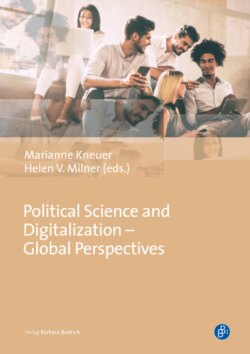Читать книгу Political Science and Digitalization - Global Perspectives - Группа авторов - Страница 5
На сайте Литреса книга снята с продажи.
[7] The Digital Revolution and its Impact for Political Science Marianne Kneuer and Helen V. Milner 1 Introduction
ОглавлениеThe digital transformation is an example of technological change that will have massive implications for politics and society. It involves a sweeping set of changes that many have likened to the Industrial Revolution. Many argue that it is bringing another enormous transformation of human life (Baldwin, 2019; Schwab 2017; Brynjolffson and McAfee 2014). These dramatic changes are among other things revolutionizing how we understand politics and how leaders govern. Social media, satellite and remote sensing imagery, and the digitization of administrative records have produced a massive amount of new data and social scientists are developing a set of novel methodological tools to deal with them. At the same time, digitalization has magnified old concerns over the future of privacy, surveillance and control, work, and the foundations of democratic governance.
While there is no universally agreed upon definition, most scholars agree that digitalization should be differentiated from a related but conceptually distinct term, digitization (e.g., Brennan and Kries, 2016: p. 556). Digitization refers to the process of converting “analog streams of information” and mechanical processes into “digital bits” and computations (Brennan and Kries, 2016: p. 556). From its earliest manifestations, digitization has been characterized by “extremely low costs, rapid ubiquity, and perfect fidelity” (Brynjolfsson and McAfee, 2014: 4). Economists characterize digitization as a “general purpose technology” — one that has transformative consequences across many industries and economic sectors (see Bresnahan, 2010; Cockburn et al 2018; Helpman and Trajtenberg, 1996). Exponential growth in computing performance and data storage has led to the broader use of digitized data (Pratt, 2013). For scholars adopting this view, digitization occupies a place alongside the steam engine, the electric generator, and the printing press in transforming all aspects of life (Schwab 2017).
Digitalization refers to the sweeping set of changes that restructure “social and political life … around digital communication and media” (Breenan and Kries, 2016: p. 556). The explosion of new data and technologies has facilitated the spread of information and action among individuals, consumers, firms, industries, movements, and governments. While some scholars view digitalization as a unique and irrepressible force that defines the contemporary world (e. g., Baldwin, 2019; Brynjolfsson and McAfee, 2012; Castells, 2010), others claim that digitization is not much different from earlier periods of technological advancement (e. g., Gordon 2015; Wolf 2015).
